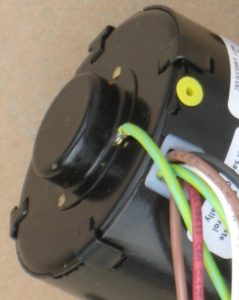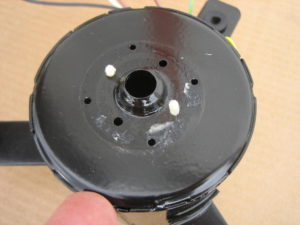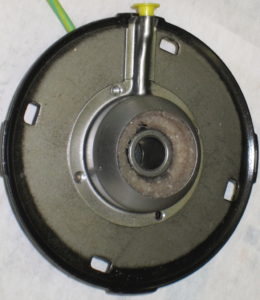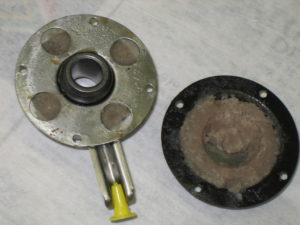FASCO Model 7190-2492
 An Oilable Replacement HRV Fan Motor for Models 1000, 2000 & 2000Plus. ENEREADY™, vanEE® and ENEREADY vanEE®.
An Oilable Replacement HRV Fan Motor for Models 1000, 2000 & 2000Plus. ENEREADY™, vanEE® and ENEREADY vanEE®.
Unlike many replacement motors, FASCO Model 7190-2492 fan motors are oilable. Specially built using long-life, sintered iron sleeve bearings, each bearing is bathed in synthetic Anderol lubricant. Typical “expected” life hours are shown below.

| Bearing Temperature °F / °C |
single oiling hours |
double oiling hours |
| 104 / 40 | 100,000 | 100,000+ |
| 120 / 49 | 50,000 | 100,000+ |
| 140 / 60 | 40,000 | 60,000 |
| 160 / 71 | 30,000 | 45,000 |
| 180 / 82 | 20,000 | 30,000 |
In this HRV application, where radial loads and shaft speeds are low, temperature is the major determining factor in bearing (and therefore motor) life. Additionally, as these motors are located in the airstream, they typically run at a mild 110°F, cooler in winter. With this critical attention to motor longevity, these motors can provide in excess of 100,000 service hours, and much longer life if re-lubricated.
The descriptions below show further upgrades to bearing lubrication reservoirs which are now standard for Eneready Model 7190-2492 motors built by FASCO.

Endbell, showing 2 (white) transfer felts. The felts re-supply lubricant from the external secondary wick (removed for photo) to re-supply the larger internal primary wick.

Interior view of primary wick reservoir showing self aligning bearing located in centre. Note yellow oil port plug and oil passage-to-primary wick.
Note: 7190-2492 directly replaces 7190-0156 and both original 7190-0369 oilable and recent non-oilable. If the Model 2000 fan motors are either Model 7164-1479 or 7164-1651, both fan motors should be replaced as a pair. In 1985 & 1986, Saskatchewan-built Model 2000 HRV’s used fan motors with significantly different torque curves compared to the Model 7190-2492 replacement motors. Mixing motors with different torque curves can create an airflow imbalance that wastes energy, and can cause cold fresh air delivery and/or premature core frosting.
